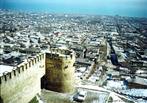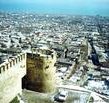
Political Tensions Rise in Dagestan with Approach of Municipal Elections
Publication: Eurasia Daily Monitor Volume: 6 Issue: 185
By:

On October 5, a police unit in the southern Dagestani city of Derbent complained of being forced by their superiors to vote for a certain candidate in the mayoral elections set to take place on October 11. Seventy-five policemen signed the complaint to the Russian Interior Minister Rashid Nurgaliev and were subsequently suspended from service (www.kavkaz-uzel.ru, October 5). Although electoral fraud is common across the North Caucasus and Russia as a whole, it is very unusual when a disciplined police force unit makes its protest public. This fact signifies the fierceness of the campaign in Derbent, the third largest city in Dagestan, with a population over 100,000.
Despite popular elections being almost discredited due to the authorities’ deliberate denigration of them across Russia and specifically in the North Caucasus, municipal elections in Dagestan still evoke enormous public interest and serious political clashes like few other places elsewhere in the country. Dagestan is considered to be so volatile, that Prime Minister Vladimir Putin personally reached out to solve a local business-related conflict between Makhachkala’s administration and the local electricity generating company, asking the mayor of Makhachkala sharply and unequivocally “Where is the money?” and demanding that the conflict be resolved (Interfax, October 6).
Six candidates are running for the post of Derbent’s mayor. The current head of the city Felix Kaziahmedov, who has been the mayor since 2000, and the head of Dagestan’s Suleiman-Stalsky, former Dagestani prosecutor general Imam Yaraliev, are considered to be the two main competitors in the race (www.kavkaz-uzel.ru, October 3). Both principal candidates are ethnic Lezgins. The race is noteworthy for the fact that the Dagestani President Mukhu Aliev supports Kaziahmedov, while relations between Aliev and Yaraliev are openly strained. Given that the end of Aliev’s presidential term is approaching, the result of the elections in Derbent will be a good indicator of Aliev’s grip on power and whether he stays or goes at the beginning of 2010.
Imam Yaraliev is a colorful political figure, having been Dagestan’s prosecutor general from 1994 to 2006 and combining alleged significant business interests with a love for writing poetry. He resigned soon after Aliev assumed power in 2006. Unlike the general pattern in the North Caucasus of top officials moving to Moscow after they resign to take sinecures there, Yaraliev stayed in Dagestan, winning the Suleiman-Stalsky district head position despite opposition from the republican authorities (Regnum, August 24).
One of the richest people in Russia and an ethnic Lezgin, Suleiman Kerimov has not revealed his interests in the Derbent electoral struggle, but he is registered with the Derbent tax authorities and so is likely to also have a stake in the race. While President Aliev tacitly supports the current head of the city, another political heavyweight, Said Amirov, the mayor of Makhachkala and a likely candidate in the next republican presidential race, supports Yaraliev (Chernovik Weekly, October 2).
Another electoral campaign currently underway is in the Gunib district of Dagestan, and it has also been marred by allegations of irregularities and the use of administrative resources by the authorities (Novoe Delo Weekly, October 2).
The city of Derbent is situated south of Dagestan on the border with Azerbaijan. Ethnic Lezgins are the ruling majority in the city and the surrounding districts, even though there is significant Azeri minority living in the town. There is an Azeri candidate for the city mayor’s position, but he is not considered to be the frontrunner. Some of the ethnic Lezgins live in northern Azerbaijan, which is adjacent to Derbent. The Lezgin nationalist organization Sadval is known for having raised the issue of the division of the Lezgin people and proposing to unite them within the borders of Dagestan. According to various estimates, there are anywhere from 180,000 to over 400,000 Lezgins living in Azerbaijan (https://lezgin.boxmail.biz/cgi-bin/guide.pl?action=article&id_razdel=50627&id_article=75374). Given that Imam Yaraliev has presented himself as the leader of Lezgins in Dagestan, he could also take a more proactive approach on the issue of the divided Lezgins. According to the expert on Dagestan Konstantin Kazenin, nationalist ideas have not eroded much among the Lezgins, because there is still the issue of the divided Lezgin people and the nationalist agenda has not been stained by vicious internal conflicts (Regnum, August 24).
Meanwhile, Derbent, previously a relatively calm Dagestani city whose tranquility was attributed to its friendly “southern character,” started to show signs of volatility, particularly in the past several months. On October 4, law enforcement officials claimed to have prevented an attempt on the life of a Federal Security Service (FSB) officer in Derbent. The attack was allegedly planned to involve using an explosives-laden car (www.kavkaz-uzel.ru, October 4).
While political life in other republics of the North Caucasus went almost completely into the shadows after Moscow abolished gubernatorial elections in 2004, the heat of the governor’s race in Dagestan seems to have sifted through to the municipal and parliamentary levels. Dagestan, being the most ethnically diverse region of Russia, can hardly be fit into the rigid Russia-wide “power vertical.” At the same time, Dagestan is the place where Moscow’s suppression of democratic participation has the most visible negative results, including a rise in political violence. So while “the power vertical” has no real power in Dagestan, its influence on the democratic process in the republic nonetheless has been clearly harmful.




